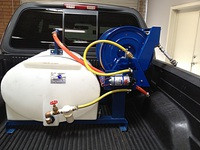5 Drawbacks to a 12 Volt Electric Power Sprayer for Pest & Weed Control
Posted by Andrew Greess on Aug 24, 2012
I am often asked by customers and prospects, what are the drawbacks of an electric power sprayer? Here are my top 5 drawbacks of electric pump sprayers.

1. Lower Output - Electric sprayers are generally lower output or volume (as measured in gallons per minute or GPM) than gas-powered sprayers. This means that 12V electric sprayer pumps are generally not suited for high-volume jobs such as termite pretreats, large weed pre-emergent jobs, or driving a large boom (e.g. golf course fairway sprayer).
2. Lower Pressure - Electric sprayers generally provide lower pressure than gas-powered sprayers. Pressure is measured in pounds per square inch or PSI. 12V electric sprayer pumps are not suited for high-pressure jobs such as spraying tall trees or long distances. Longer hoses can be a problem for the lower pressure electric pumps to push through. We have also seen hose problems with low-pressure electric pesticide spray pumpspump sprayers. Here are 2 examples:
1. The spray hose is old and mushy, it swells to absorb pressure and there is no pressure left to push the water through the hose.
2. The spray hose wound too tightly on the reel, and the pump doesn’t have enough pressure to push the water through the squished-down hose.
3. Volume Pressure Tradeoff – In addition to generally having less volume and less pressure than gas-powered pumps, 12V electric sprayer pumps usually have a significant tradeoff between volume and pressure. You can find a higher pressure electric pump, but it will be lower volume (and vice versa). On the other hand, gas-powered pumps are available in high volume, high pressure if needed (for example, diaphragm pumps). You won’t find a 12V high-pressure spray pump that also delivers high volume.
4. Transferring Sprayer to another Vehicle – Electric pump sprayers are usually wired to the truck battery. For this reason, if you have to transfer the rig to another vehicle (for example, the initial vehicle requires service), it is a little more involved. The rig must be wired to the battery of the new vehicle. Contrast this to a gas-powered sprayer, where the power source is part of the sprayer. It just needs to be transferred to the backup vehicle. No wiring is required.
5. Fail Points – For pest and weed control, there isn’t a “best” 12V high-pressure spray pump. Our experience is that all 12V electric sprayer pumps commonly used for pest control and weed control applications have weak points that fail. Examples:
- Shurflo – Generally reliable pumps. The pressure switch senses demand (i.e., you are squeezing the spray gun trigger) and turns the pump on. The constant off and on takes its toll on this switch, which is the first component to fail. Also, if you don’t occasionally run clean water through the electric sprayer pump, some chemicals build up in the valves, which is a problem.
- Pumptec – These are heavier duty 12V electric sprayer pumps than Shurflo. They draw more amps than Shurflo. We recommend these pumps be run off a separate battery (not the truck battery), or the vehicle be left running while the pump is on. If the pesticide spray pump is operated from the pump battery, the battery will run down, and the pump motor will begin running hot. Eventually, the motor will burn up. This is not a warranty situation.
- Flojet – They make some high-volume pumps, but our experience is they are not good in continuous use situations (like a pest control or weed control route). They are good for intermittent duty only.
- I make points ‘1A’ through ‘3C’ above as issues to be aware of and deal with. Not as reasons to avoid these 12V electric pump sprayers.
While these sprayers have their limitations, they also come with certain advantages. Just don’t expect to find a 12V high-pressure spray pump suitable for regular pest and weed control. You can learn about the benefits of electric power sprayers elsewhere on my blog. I will discuss the pros and cons of gas-powered sprayers in a future post.
I would appreciate your comments.
